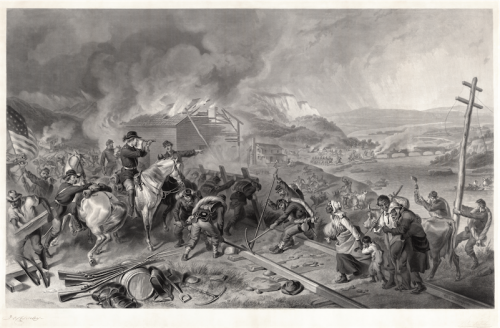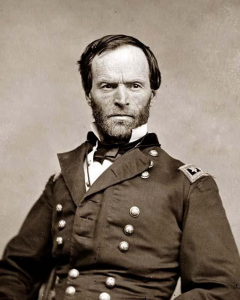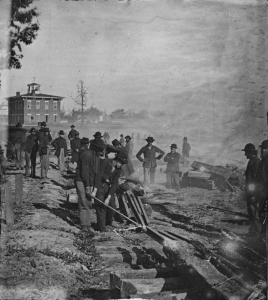
For those unfamiliar with it, the American Civil War (1861-1865) was fought between the northern US (the Union) and the southern parts of the US (the Confederacy) fundamentally over the issue of the Confederate States’ desire to own other human beings as slaves.

The torture, debasement and brutality required to keep humans slaves is almost beyond the comprehension of civilised people in 2014. It speaks volumes that the recent Quentin Tarantino film “Django Unchained”, if anything, underplays the depravity. When a regime’s violence prompts Tarantino to dial it back you’re in an especially horrific place.
Maj-Gen William Tecumseh Sherman’s March, from Atlanta to Savannah, from November 15 to December 21, 1864, has been described by the likes of British historian BH Liddell Hart as an act of military genius on a par with Scipio Africanus, Belisarius, and Napoleon Bonaparte.
Taking off without lines of supply or communication, his army cut a swathe 60 miles wide through the heartland of the south, destroying its industry, tearing up its railways, and burning down the slaving plantation owners’ grand houses.
The very shaky re-election prospects of Abraham Lincoln were saved by Sherman’s capture of Atlanta. One shudders to think of what world we would live in today if failed Gen George McClellan, with a party platform of immediately ceasing hostilities and negotiating with the Confederates, had triumphed.
It’s entirely possible human bondage would be widespread in the world today instead of unpleasantly exceptional (for all that we could do more to stamp it out in the pockets where it lives on).
Of no small moment was Sherman’s freeing of the slaves. Not wanting to have to feed and protect them, he broke their chains and issued them each 40 acres of land and a mule. Post war appeasement of the southerners sadly led to these proclamations being revoked. A source of resentment to this day.
At this point let us tip our hats to the 1st Alabama Cavalry Regiment (Union), 2000 southern hill farmers who saw no value in fighting for the property rights of wealthy plantation owners and signed up on the right side of history. Post war they all had their houses burned down for their troubles.

To the extent that Sherman is remembered today it is because he destroyed a great deal of southern landholders’ property. The south remains outraged at the humiliation of it.
People who started a war (that killed more than 500,000 people) to maintain the untrammelled right to rape, assault, torture and exploit other human beings, objected to the destruction of property. It takes a special kind of southern logic.
As an eight-year-old on a family holiday in Virginia, I looked out the car window and saw painted on the side of a water tower: “Welcome to Historic Appomattox”.
“Why is Appomattox historic, daddy?” I asked.
“It’s where the Civil War ended,” is my recollection of his reply.
In large part thanks to Sherman and his Army of the Cumberland, and their willingness to take flame and the sword to people who looked and talked like themselves, for the benefit of those who did not.
John Griffiths in the online editor of citynews.com.au
Who can be trusted?
In a world of spin and confusion, there’s never been a more important time to support independent journalism in Canberra.
If you trust our work online and want to enforce the power of independent voices, I invite you to make a small contribution.
Every dollar of support is invested back into our journalism to help keep citynews.com.au strong and free.
Thank you,
Ian Meikle, editor




Leave a Reply